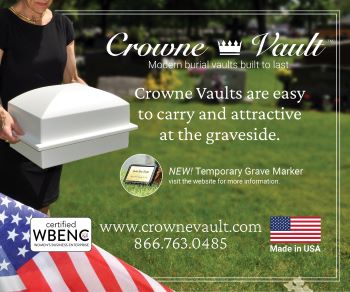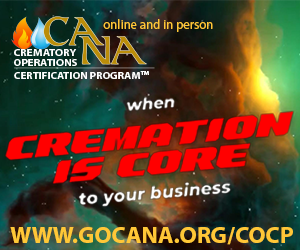When is the right age to establish a preneed account? . . . Maybe on your wedding day

We’ve touched on the subject in this forum before — when is the proper age, as a consumer, to look into getting a preneed funeral/cremation account? I’ve opined that our funeral home used to look at Social Security age and then lowered that to age 55 and over. Lately, according to all that I read, the pandemic has made younger adults think about their mortality and their death care wishes.
But, are preneed plans so vital that one should think about having them in place on their wedding day? According to this article from Slate, that is exactly what this 25-year old widow wishes would have happened. It’s a touching story that tells of a marriage being ended 18-months into the marriage by an accident that claimed the life of the husband.
The wife, now widowed, reflects on the fact that when she said “I do” she not only became a wife. . . . but the “next-of-kin” on that day. And, unfortunately, only 18 months later, she was acting with “next-of-kin” responsibilities in tending to the death care choices of her husband.
She mentions that “in passing” her husband had told her that a celebration of life would be appropriate for him. However, that was thinking ahead 40 to 50 years where there would be children and grand-children who could “celebrate” his life. At that time of an accident 18 months into the marriage, a celebration did not seem fitting.
So. . . there she was. . .having to make all of the necessary arrangements with no true guidelines to go on. She makes this comment on what she now believes, “there are easy, key steps that can be taken to protect your loved ones in the unlikely event of a worst-case scenario. They’re not exactly fun, per se, but neither is being unprepared. With that in mind, here’s how to plan for the end at the beginning.”
Funeral Director Daily take: This is a real case scenario with real world ramifications. Maybe as funeral professionals, who have all dealt with accidents, we are not stern enough about telling young people, especially young married couples, to make some provisions for their demise. It can sound morbid, but I think it is truly an act of love.

Tom Anderson
Funeral Director Daily
Reading this article brings me back probably 30 years or so ago. On a Sunday afternoon I made funeral arrangements with a young widow whose husband had died in an accident. She came from a small church south of town while her husband grew up in a small church north of town. While most of the funeral arrangements went off as usual, the discussion on which church cemetery to bury her husband became a bone of contention between her and her husband’s mother. As you can imagine, each of the church cemeteries had reasons to be the final resting place.
His mother wanted him buried where he grew up (the church of his youth) and his wife wanted him buried where she intended to be buried (the church of her youth). To put it mildly, let’s just say that this issue took the funeral arrangements off the track and I wonder to this day if the families speak to each other. By the way, I’ve always felt bad that I could not be a better peacemaker at that time. . . generally, I was very good at getting families over decision obstacles, but in this case I could not help.
When I went home later on that Sunday afternoon my wife, of about three years at the time, asked me what took so long. I explained to her and she immediately asked me, “Where do you want to be buried?” We had a short discussion of our funeral wishes then and there and shortly thereafter went and purchased cemetery lots. We didn’t formally pre-arrange but we each knew each other’s wishes. And, quite frankly, that short discussion has given us a peace of mind over the past thirty years.
Sometimes funeral directors and pre-planners feel like they are pushing people on making decisions. But, you know what? If they don’t make those decisions when they are together and can. . . . there will be decisions to make when there is only one side represented. And, that is not the best way to make decisions for couples that have made every other decision as a team.
I’ve taken the position that not everybody will pre-arrange. However, when I lead seminars on the discussion I always tell people that if they are not going to do anything formal with a funeral home they, at the very least, need to talk with their spouse about the following three choices in today’s world:
- Do they want to be buried or cremated?
- Where do they want their body or cremated remains to be interred for permanent memorialization?
- How will you pay for the services you choose?
It is my opinion that at least if they have discussed those items the surviving spouse has some idea of how their loved one would prefer their death care wishes and somewhat of a road map is in place.
If you are a funeral professional who deals with preneed or you are a preneed counselor, “Be Bold” in letting potential clients know of the value of Pre-Arrangement. Many times we forget that the beneficiaries of funeral pre-arrangements are not just the funeral home and the counselor/agent. . . . .most of the time the biggest beneficiary is the client(s) themselves.
Related — There’s more to life than just living – like planning your funeral. The Times-Union (NY)
More news from the world of Death Care:
- Want to become a tree when you die? Company offers to plant tree in your corpse. Cowboy State Daily (WY)
- Gravestones damaged in historic Vineland, NJ cemetery. Video story and print article. WPVI – TV Philadelphia (PA)
- Northern Pyre wants to bring Open-air cremation to Minnesota. Racket
- New Jersey entrepreneur to open weed dispensary at site of longtime funeral home. NorthJersey.com (NJ)
Enter your e-mail below to join the 3,144 others who receive Funeral Director Daily articles daily:



















